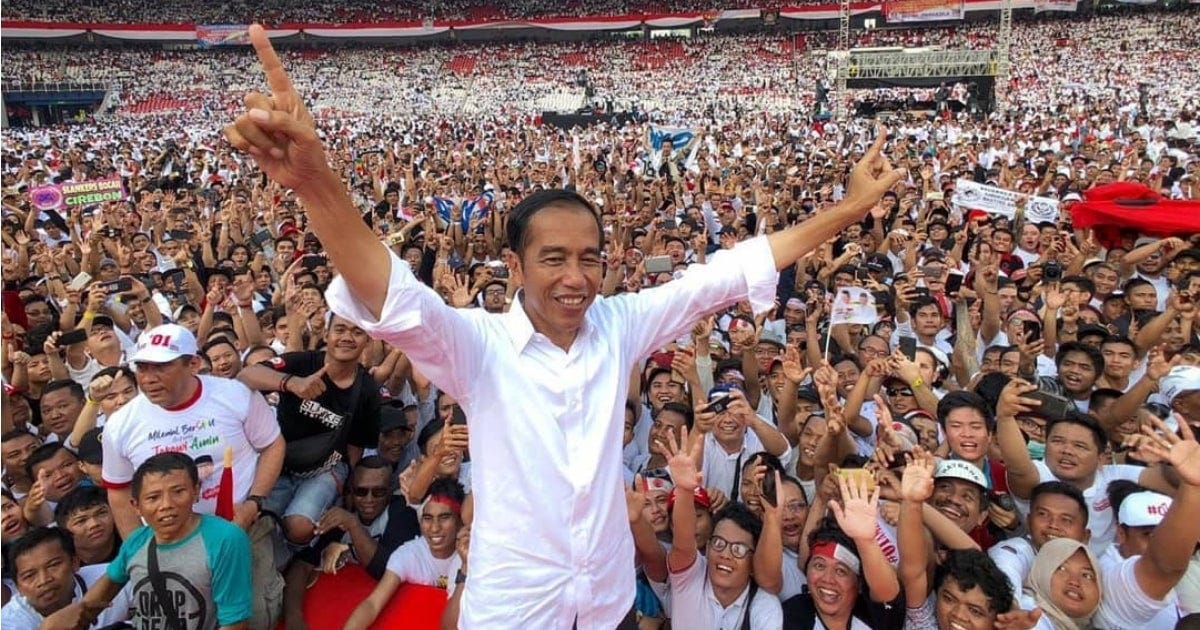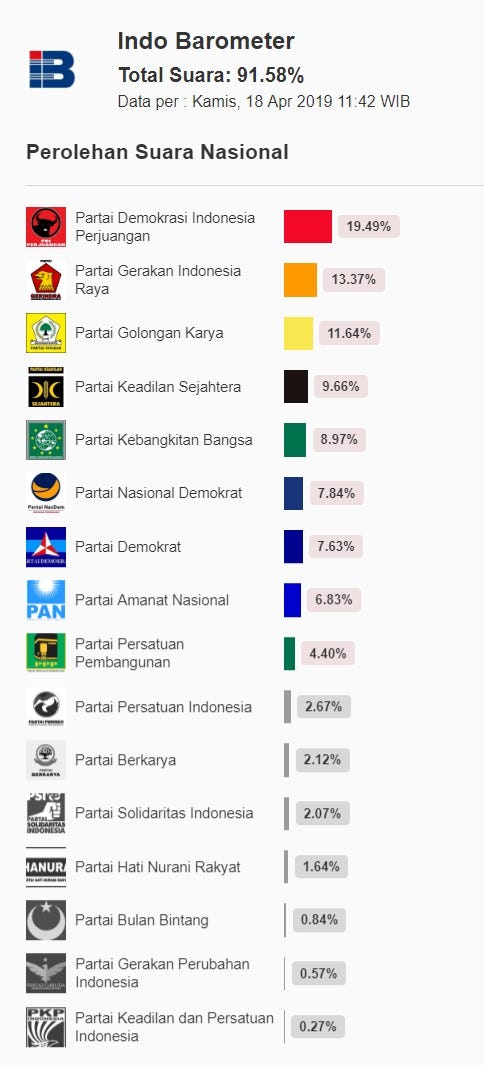Jokowi wins | Prabowo claims victory | Which parties made the cut? | Economic implications (Indonesia Intelligencer special post-election edition)
Hello, and thanks for reading this special free post-election edition of Indonesia Intelligencer in which we’ve wrapped up the main takeaways from yesterday’s vote and rounded up the best reactions from the media and academics. If you’re not yet a paid subscriber and would like to get all of the most essential news about Indonesia sent to your inbox every week, sign up here for a free 1-month trial. Thanks again and have a good long weekend!

Jokowi wins, graciously
Based on the nearly unanimous quick count results of pollsters (which have all nearly completed 100% of their sample counts as of this morning), President Joko Widodo and running Ma’ruf Amin have defeated Prabowo Subianto and his running mate, Sandiaga Uno, by about 8-9%
Despite the near mathematical certainty of his win, Jokowi declined to declare victory yesterday, instead asking his supporters to wait for the official results from the General Election Commission (KPU).
The KPU has until May 22 to complete the real vote count and deliver the official results to the public, though they may release the results sooner than that.
Prabowo claims victory
Rather than concede defeat, Prabowo claimed victory during a speech yesterday evening, claiming that his campaign’s exit polling had shown that he had actually emerged the victor with 62% of the vote.
The Gerindra chief urged his supporters not to resort to anarchy or anything illegal, claiming he would emerge the victor through legal means. But he did ask them to “guard” the ballot boxes and voting forms that would be needed to prove his victory
Many have noted that Prabowo’s actions yesterday were almost exactly how he reacted in 2014 when quick count votes showed that Jokowi had won, claiming both victory and voter fraud while threatening to bring his case to the Constitutional Court. When the KPU made his loss official, Prabowo claimed systemic cheating but never actually mounted a legal challenge to the result.
Prabowo’s camp has not yet indicated if they will make any legal challenges to the result. They have also refused thus far to release their exit polling data supposedly verifying Prabowo’s 62% win.
Sandiaga had the hiccups: Notably absent from Prabowo’s side as he claimed victory yesterday was running mate Sandiaga Uno. According to their campaign, Sandiaga could not make an appearance due to “hiccups” (yes, seriously) but many political observers suspect it's because he did not want to be associated with Prabowo’s claims of victory and voter fraud due to concerns it could affect his chances as a presidential candidate in 2024 (which many believe his VP candidacy this year was an audition for).
Legislative election: winners and losers
Based on still-incomplete quick count results in the legislative elections, these are the nine parties that will meet the 4% threshold required for parliamentary representation: PDI-P, Gerindra, Golkar, PKS, PKB, NasDem, the Democratic Party, PAN, and PPP.
These are the seven not likely to make the cut: Perindo, Berkarya, PSI, Hanura, PBB, Garuda, and PKP.

High turnout, no golput effect?
Quick count results also indicate a significant increase in voter turnout this year compared to the 2014 presidential election, which suggest high levels of voter enthusiasm
According to Saiful Mujani Research & Consulting (SMRC), voter turnout this year was at about 80%, up from 69% in the 2014 presidential election and 75% in the 2014 legislative election.
Many analysts were concerned about the rise of various golput movements that called upon those unsatisfied with this year’s candidates to voice their protest by either not voting or not choosing a candidate. Those movements do not seem to have depressed voter turnout, but their impact (or lack thereof) won’t be known until the official KPU results are released.
Economic implications of Jokowi’s win
Financial markets responded favorably to the news of Jokowi’s all-but-assured victory, with the Jakarta stock index rising 1.5 percent this morning and the rupiah opening at 14,000 per dollar, up 0.57 percent from the previous close. The benchmark 10-year government bond yields edged down to 7.59 percent.
For analysis on what Jokowi’s re-election portends for the future of Indonesia’s economy:
Jokowi gets mandate to keep pushing Indonesia's economy forward (Asia Nikkei Review)
It’s Now or Never for Jokowi to Fix Indonesia After Election Win (Bloomberg)
Recommended reads
Indonesia election: Hardline Islam, where it all went wrong for Prabowo Subianto (SCMP)
Jokowi also benefited from the Islamists overplaying their hands. Moderate and minority voters had been crestfallen when Jokowi chose Ma’ruf – who was instrumental in bringing down Ahok and once forbade Muslims to say “Merry Christmas” to Christians – and felt let down by his lack of attention to human rights problems. They may have thought to skip the election but finally decided to hold their collective noses and vote for Jokowi, resulting in the spectre of a low turnout or high numbers of spoilt ballots – which would have worked in Prabowo’s favour – not materialising.
Islamism Is the Winning Ticket in Indonesia (Foreign Policy)
It remains to be seen how Maruf’s presence at the highest levels of Indonesian government will affect Jokowi’s second term. But both tickets’ accommodation of Islamism is in step with global trends in Muslim-majority countries, where democracy has not dovetailed with secularism, as the Brookings Institution scholar Shadi Hamid argued in his book Islamic Exceptionalism. Many other Muslim-majority countries, such as Egypt and Turkey, have structural similarities with Indonesia, with mid- or late-20th-century periods of secular authoritarianism that eventually yielded to populist currents of long-repressed Muslim religiosity. In all these places, Islamism has a seat at the table.
Jokowi set to win: Melbourne experts respond (Indonesia at Melbourne):
Dr Dave McRae, Senior Lecturer at the Asia Institute
After an election campaign lasting almost seven months, President Jokowi appears to have been re-elected with a status quo political base, albeit via a poll in which Islamic symbolism was much more prominent than in 2014. Jokowi’s personal victory margin over Prabowo may turn out to be several percent greater than in 2014, depending on where the actual result falls within the margin of error of the various quick counts showing Jokowi to be the victor. But even an increased margin is unlikely to translate to increased political capital for Jokowi – public approval was not his primary problem throughout his first term.
Standing for parliament, and against mining in Kalimantan (New Mandala)
But in the 2019 election campaign, some Indonesian politicians in Kalimantan are trying to speak out against the excesses of the extractive industries there. In Samarinda, East Kalimantan, Baharuddin Demmu (Bahar), a National Mandate Party (PAN) member of the provincial parliament, is a rare example of an activist-turned-politician who continues to criticise extractive business interests and their local elite allies even after joining the local parliament. I spent a week observing Bahar and a number of activists and community members in the 2019 legislative election campaign to try to understand how mining influences electoral politics in East Kalimantan, and the challenges an activist-turned-politician faces in campaigning on a platform of environmental sustainability.


